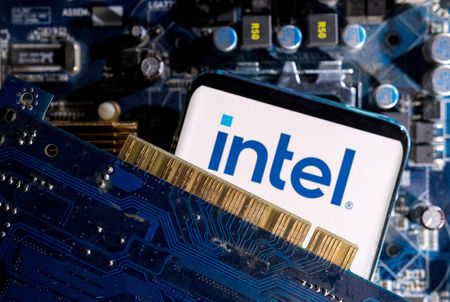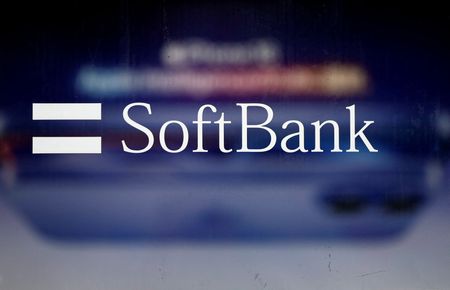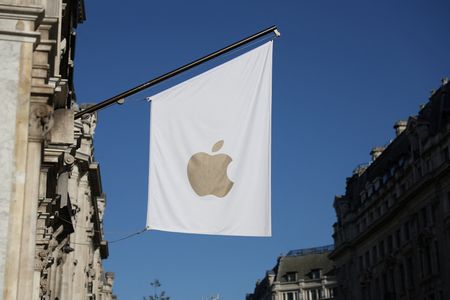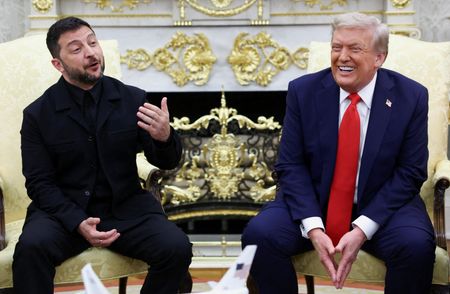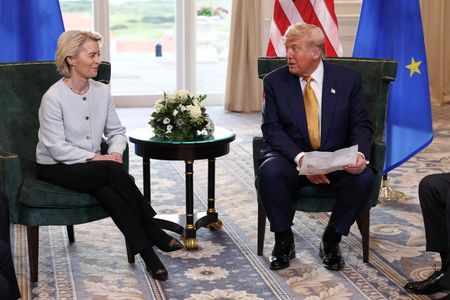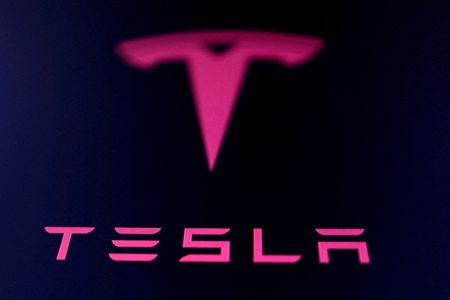By Jaspreet Singh, Max A. Cherney and Anton Bridge
(Reuters) -Intel is getting a $2 billion capital injection from SoftBank Group in a major vote of confidence for the troubled U.S. chipmaker that is in the middle of a turnaround effort.
The equity investment, announced by the two companies on Monday, is a lifeline for the once-iconic U.S. chipmaker which has struggled to compete after years of management blunders that left it with virtually no foothold in the booming artificial intelligence chip industry.
It will make SoftBank a top-10 shareholder of Intel and add to the Japanese tech investor’s ambitious bet on artificial intelligence that includes the $500 billion Stargate U.S. data center project.
The deal follows media reports last week that the U.S. government may buy a stake in Intel, after a meeting between new CEO Lip-Bu Tan and President Donald Trump that was sparked by the President’s demand for Tan’s resignation over his ties to Chinese firms.
SoftBank’s decision to invest in Intel is not connected to Trump, a person familiar with the matter told Reuters. The White House did not immediately respond to a request for comment.
“This strategic investment reflects our belief that advanced semiconductor manufacturing and supply will further expand in the United States, with Intel playing a critical role,” SoftBank CEO Masayoshi Son said in a statement.
It will pay $23 per Intel share, a slight discount to Monday’s closing price of $23.66.
SoftBank’s investment will come via a primary issuance of common stock by Intel, and, based on the U.S. company’s market capitalisation at close of trading on Monday, represent an equity stake of just under 2%, an Intel spokesperson said.
The Japanese company would become the sixth largest investor in Intel, according to LSEG data.
SoftBank shares dropped more than 5% on Tuesday following the announcement, while Intel surged 5.6% in after-market hours trading.
The Japanese company will only take an equity stake in Intel and will neither seek a board seat nor commit to buying Intel’s chips, the person familiar with the matter said.
MULTIPLE CHALLENGES
Intel has struggled financially and recorded an annual loss of $18.8 billion in 2024, its first such loss since 1986, as it grapples with multiple challenges.
Its longtime rival AMD has been gaining share in Intel’s mainstay personal computer and server semiconductor markets, while its ambitious and costly plan for a chip contracting business that rivals that of Taiwan’s TSMC has failed to take off.
The company is now considering a significant change to its contract chip manufacturing business to win major customers, Reuters reported last month, in a potentially expensive shift from its previous strategies.
“Intel’s dual role as designer and manufacturer/fabricator uniquely positions it as potentially the best platform in the U.S. to compete with TSMC,” said Charu Chanana, chief investment strategist at Saxo.
Bloomberg News reported earlier on Monday that the U.S. government is in talks to take a 10% stake in Intel.
SoftBank declined to provide more details on the Intel investment when asked to comment by Reuters.
The Intel funding is the latest in the Japanese company’s run of mammoth investment announcements in 2025, which include committing $30 billion to ChatGPT maker OpenAI as well as leading the financing for Stargate.
On Monday Taiwan’s Foxconn said it plans to manufacture data centre equipment with SoftBank at the Taiwanese firm’s former electric vehicle factory in Ohio as part of the Stargate project.
(Reporting by Jaspreet Singh in Bengaluru, Max Cherney in San Francisco and Anton Bridge in Tokyo; Additional reporting by Angela Christy in Bengaluru and Ankur Banerjee in Singapore; Writing by Miyoung Kim; Editing by Alan Barona and Muralikumar Anantharaman)

